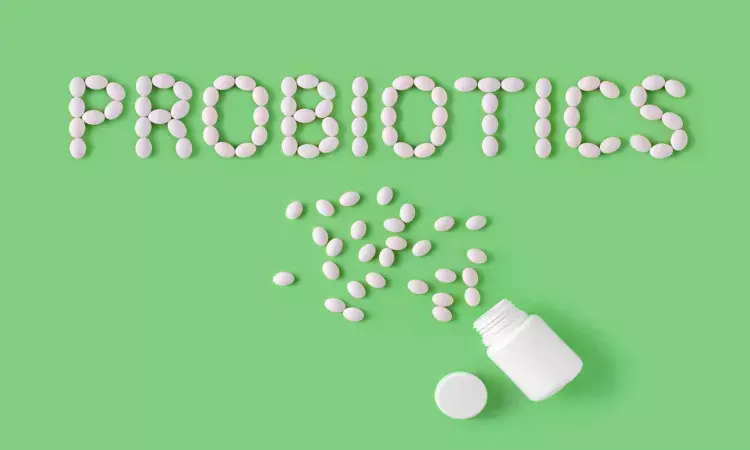- Home
- Medical news & Guidelines
- Anesthesiology
- Cardiology and CTVS
- Critical Care
- Dentistry
- Dermatology
- Diabetes and Endocrinology
- ENT
- Gastroenterology
- Medicine
- Nephrology
- Neurology
- Obstretics-Gynaecology
- Oncology
- Ophthalmology
- Orthopaedics
- Pediatrics-Neonatology
- Psychiatry
- Pulmonology
- Radiology
- Surgery
- Urology
- Laboratory Medicine
- Diet
- Nursing
- Paramedical
- Physiotherapy
- Health news
- Fact Check
- Bone Health Fact Check
- Brain Health Fact Check
- Cancer Related Fact Check
- Child Care Fact Check
- Dental and oral health fact check
- Diabetes and metabolic health fact check
- Diet and Nutrition Fact Check
- Eye and ENT Care Fact Check
- Fitness fact check
- Gut health fact check
- Heart health fact check
- Kidney health fact check
- Medical education fact check
- Men's health fact check
- Respiratory fact check
- Skin and hair care fact check
- Vaccine and Immunization fact check
- Women's health fact check
- AYUSH
- State News
- Andaman and Nicobar Islands
- Andhra Pradesh
- Arunachal Pradesh
- Assam
- Bihar
- Chandigarh
- Chattisgarh
- Dadra and Nagar Haveli
- Daman and Diu
- Delhi
- Goa
- Gujarat
- Haryana
- Himachal Pradesh
- Jammu & Kashmir
- Jharkhand
- Karnataka
- Kerala
- Ladakh
- Lakshadweep
- Madhya Pradesh
- Maharashtra
- Manipur
- Meghalaya
- Mizoram
- Nagaland
- Odisha
- Puducherry
- Punjab
- Rajasthan
- Sikkim
- Tamil Nadu
- Telangana
- Tripura
- Uttar Pradesh
- Uttrakhand
- West Bengal
- Medical Education
- Industry
Probiotics during breastfeeding reduce allergic rhinitis risk in children

Delhi: Administration of Lactobacillus reuteri, a supplemental probiotic, to breastfed newborns reduces the risk of allergic rhinitis later in life, suggests a recent study. The results of the study were presented at the European Academy of Allergy and Clinical Immunology (EAACI) 2020 Digital Congress.
According to the authors, probiotic addition to a child's diet changes microbiota composition.
Lilijana Besednjak-Kocijančič, from the Primary Paediatric Health Centre in Nova Gorica, Slovenia, and colleagues assessed 316 healthy-weight newborns who had parents with test-confirmed allergy.
All infants were breastfed for 4 to 6 months. The 115 infants in the probiotic group received five drops of L reuteri daily from the age of 4 weeks to 12 weeks. The 201 children in the control group were breastfed without any supplements. All children were followed by the same pediatrician until they were 9 years of age.
Read Also: No probiotics for most digestive conditions, recommend AGA guidelines
Key findings of the study include:
- During the follow-up period, 19.6% of the children had developed allergic rhinitis or allergic rhinoconjunctivitis — confirmed with elevated IgE and positive skin-prick tests — at some point.
- Children in the probiotic group were three times less likely to develop allergic rhinitis than those in the control group (4.3% vs 13.9%).
- For allergic rhinoconjunctivitis, the difference was less pronounced (8.7% vs 9.5%).
- The frequency of allergic rhinitis and the mean duration of episodes were "significantly lower" in the probiotic group than in the control group.
"Breastfed newborns who receive a supplemental probiotic — Lactobacillus reuteri — are less likely to develop allergic rhinitis later in life," concluded the authors.
Read Also: Vitamin D can mitigate chemotherapy induced gastrointestinal mucositis
The benefit of another probiotic, NVP-1703 — a mix of Bifidobacterium longum IM55 and Lactobacillus plantarum IM76 — in adults with allergic rhinitis was shown in separate study presented at EAACI by Min-Gyu Kang, MD, from Chungbuk National University Hospital in Cheongju, South Korea.
References:
European Academy of Allergy and Clinical Immunology (EAACI) 2020 Digital Congress.
Dr Kamal Kant Kohli-MBBS, DTCD- a chest specialist with more than 30 years of practice and a flair for writing clinical articles, Dr Kamal Kant Kohli joined Medical Dialogues as a Chief Editor of Medical News. Besides writing articles, as an editor, he proofreads and verifies all the medical content published on Medical Dialogues including those coming from journals, studies,medical conferences,guidelines etc. Email: drkohli@medicaldialogues.in. Contact no. 011-43720751


